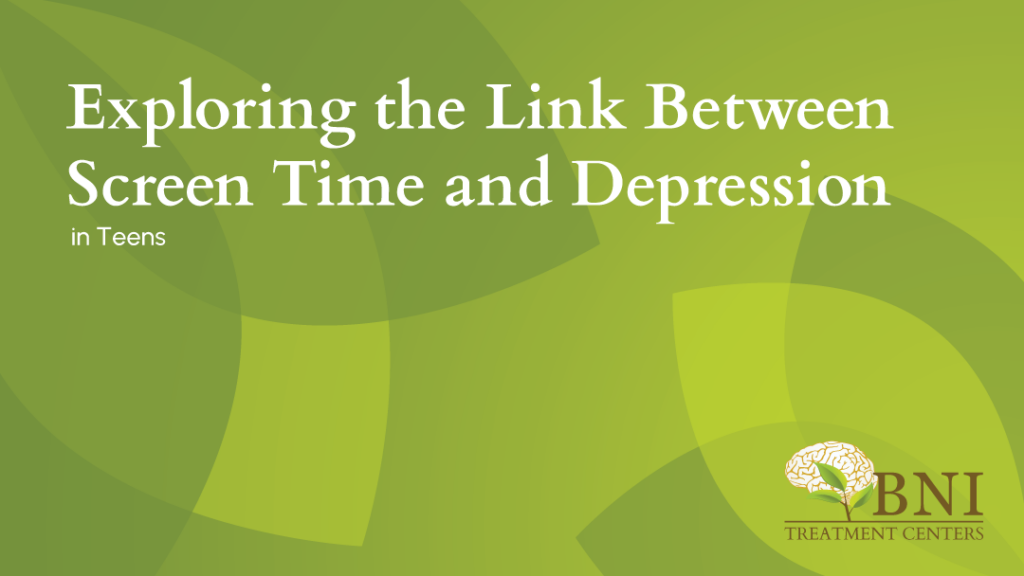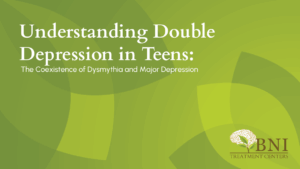
Evidence suggests teens spent over 8 hours a day looking at screens for entertainment purposes in 2021. That number may seem astronomical at first, but take a moment to consider how often teens look at their phones, computers, televisions, e-readers, and tablets. All of these contribute to increased screen time.
Research links increased screen time to depression in adolescents. As mental health professionals who work closely with teens and their families, this concerns us at BNI Treatment Centers as much as it concerns you. We all want teens to thrive and grow into healthy adults. Let’s explore the relationship between screen time and depression, and what adults can do to help teens reconnect with the world around them.
The Science Behind the Link Between Depression and Screen Time
There are a multitude of studies on technology and its influence on mental health, especially in adolescents. One from 2024 found screen time correlated with more mental health symptoms as a whole in young adolescents, with depression being the most prevalent.
Another meta-analysis of multiple studies indicated screen time was a predictor of depression symptoms. While the researchers said the exact influence of screen time on depression might vary based on age, gender, location in the world, and duration of screen time, the correlation was clear.
Research on adolescents and screen time during the COVID-19 pandemic also yielded interesting results. Duration of screen time increased exponentially from previous years during the COVID-19 era, and poorer mental health and higher stress levels were associated with more screen time. Adolescents with less screen time had better social support and coping behaviors.
Why Are Teens Susceptible to Depression From Too Much Screen Time?
Sufficient sleep, socialization, and learning resilience are vital for adolescents as they grow into young adults and learn to live for themselves. These factors all have a tremendous effect on mental health and the likelihood of developing depression.
Screen time can disrupt all of this.
Teens often stay up late using screens. The blue light they give off can hinder melatonin production, an important component of falling and staying asleep. Sleep deprivation denies the body and brain important hours to heal and grow, which is even worse for teens than adults. Sleep deprivation is also linked to depression in teens.
Beyond this impact on their health comes the damage popular social media apps can do to their psyche. Adolescents are often susceptible to comparing themselves to unrealistic standards on social media. This can lead to feelings of inferiority and poor body image, especially in girls, and increases the likelihood of depression.
The anonymity of the internet makes way for cyberbullying, too, which can be even crueler than what may happen in person. In one study, teens who were victims of cyberbullying were twice as likely to experience depressive symptoms than adolescents who weren’t. Cyberbullying wouldn’t be possible without technology and the screens that come with it.
Screens can also discourage teens from in-person connections, which are important to social development and mental health.

How Depression Leads to Excess Screen Use: A Self-Reinforcing Cycle
It’s important to keep in mind that most studies highlight a correlation between depression and screen time, not causation. While screen time may cause more depressive symptoms in teens, we must consider the influence of depression on screen time as well.
Teens who are depressed are more likely to stay in their rooms and withdraw from the outside world. Some may retreat to the internet, finding interaction and entertainment there easier than in person. Teens who feel depressed also may be more likely to sit on the couch or stay in bed binge-watching their favorite shows to cheer themselves up. Mindlessly scrolling through social media is an easy activity for teens to occupy themselves with when everything feels boring or challenging. They may also neglect other responsibilities and activities they once enjoyed due to depression, leaving additional free time that they use their screens to fill.
The Role of Excessive Screen Time in Worsening Depression
Just as evidence shows that depression leads to increased screen time, it also shows that screen time can worsen depression, creating a vicious cycle that teens often get trapped in.
More screen time is associated with more mental health concerns. Screens can disrupt circadian rhythms and increase the stress hormone cortisol. One study also found that youth with high screen time experienced similar changes to their brains as those who drank alcohol early in their lives. This is an alarming discovery and more research on the direct effects of screen time on depression is needed.
How to Help Your Teen Decrease Screen Time: Setting Clear Expectations
Setting boundaries and rules about screen usage is recommended. You may find it helpful to develop a “screen time contract” so these expectations are laid out clearly. This will ensure your teen knows you’re serious, empower you to deliver consequences when appropriate, and give your teen room to negotiate based on their desires. If an adolescent feels like they’ve had a hand in developing boundaries, they’re more likely to respect them.
Here are some things to consider when setting rules around technology:
- Limiting screen time hours. There are phone applications to help with this.
- Implementing screen-free times during the day, such as at meals and before bedtime.
- How often your teen checks their notifications. Consider turning sound cues or notifications off altogether for particularly time-consuming websites.
- Your teen’s support system. If your teen spends time using screens because they have long-distance friends or family, their usage may be more appropriate and warrant more time than aimlessly scrolling social media. If they’re neglecting face-to-face relationships in favor of screens, cutting time may be wise.
- How much you know about your teen’s screen time. Clear communication about your teen’s online whereabouts is important and worth including in any guidelines. Secrecy may warrant less screen time.
- Leading by example. You should be willing to follow the same rules regarding technology as your teen does.

Teen Depression Treatment in Los Angeles
If your teen is managing depression, it likely won’t go away by reducing screen time alone. More in-person social connection and better sleep will certainly help, but they may need teen depression treatment. There, they will receive therapy to work through their concerns, heal, and build a brighter future.
BNI Treatment Centers is a mental health treatment facility for youth ages 12-17. We are proud to serve the Los Angeles area. Teens in our program will see a psychiatrist nearly every day. This means we can manage medication as needed and find solutions quickly as your teen’s mental health situation evolves. Our expertise is at your family’s disposal. Call us at (888) 522-1504 for more information.
BNI Treatment Centers: Science-based, evidence-backed, compassion-led.




